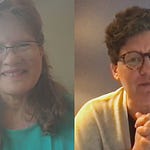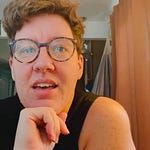I want to reflect today on the very simple and foundational truth of the spiritual life, that we are primarily, first and foremost, spiritual beings having a human experience.
I believe it was Pierre Tellard Chardin1, the Catholic priest who was excommunicated for his deep thinking and profound writings, who first made this statement: “We are spiritual beings having a human experience.” This is foundational to how Emmanuel Swedenborg understands creation and life and weaves through all of his writings.
I wonder if this is something you believe? That you are primarily a spiritual being having a physical human experience? And I wonder how this belief affects your day-to-day life? Your moment-to-moment choices and actions?
Because this is really where faith comes alive. Faith is not just about having ideas about things. It's about how we live in the world. And how does knowing ourselves to be primarily spiritual beings affect the way that we are in the world?
For myself, I've been thinking a lot about Helen Keller, who I'm often thinking about, who many of you know, I am currently casting a vision and creating a new kind of community around, her life and her story. And I see her as someone who knew herself deeply, first and foremost to be a spiritual being, full and complete, manifest in the world in a particular body with particular gifts and particular limitations.
And one of the things that Helen understood and that she articulated was that life for her was not just about happiness or satisfying the pleasures of this material body, but that the satisfaction of life comes from “commitment to a worthy purpose.” I see a real resonance between that statement and this invitation to live as spiritual beings.
If we really know ourselves to be spiritual beings, then the first thing we have to let go of is the idea that we are here primarily to satisfy the pleasures and comfort and security of our flesh. It's definitely very easy to fall into that trap. And we might understand the history of civilization as a history of a people working very hard to satisfy and make more secure this earthly experience. A huge part of our humanness wants that and it's not a surprise, our flesh gives us a lot of pleasure and we want our flesh to be healthy and well and secure. So all of that impetus is not wrong or bad. But if that's all we're doing, trying to get the most time we can and be as satisfied and comfortable as we can, then we're not really thinking about satisfying the deeper part of who we are, which is this spiritual part. This part of us that is beyond the flesh. this part of us that is connected to eternity and to all that is.
And so while humans have been involved in the enterprise of satisfying the needs of the flesh for, you know, since time immemorial, we also tend to have this little voice in us that calls us to consider these deeper longings of the spirit. And that call of those deeper longings, I'm suggesting Helen Keller was articulating when she spoke of “a worthy purpose.”
There is something in our divine humanness that is unique to us and that is reaching out to fulfill a worthy purpose that might benefit and bless the whole of the beings that exist in this universe. And when I say the whole of the beings that exist in this universe, I'm really thinking about all the souls of people who have ever lived and whoever will live. The spirit of the natural world and the creatures in it, this force of life that is cycling through many different material experiences that has a wholeness to it, an eternal reality to it that is more real than the flesh that we are temporarily inhabiting right now. More real than the historical structures of the earth that we've created and that will be created and that will pass away. That there’s something more substantial and whole and real that we are all a part of and that we are called to serve, to contribute to. One of the theological frames that gives some structure to this idea is the Swedenborgian understanding that God IS this universal human form. That God is eternal and always and unchanging and we're all a part of that totality and so we're all kind of like cells of of this larger God of this larger whole and that whole is inside of us.
You know, my cells are constantly renewing. My body is letting go of substance, bringing in substance. It's constantly being born and dying inside. And yet I'm having this consistent experience of life where I'm here and I'm Sage and you can speak to me and know me over time.
And in that same way, this eternal body of God that we're all a part of is a stable whole, a consistent whole, an eternal whole, an unchanging whole, and we are a part of that.
And while our material experience of that wholeness changes, on the inside there is this eternal part of us that is unchanging, that is tied to that whole. And that is where our real work lies.
Receiving and appreciating and responding to that eternal spark in us that isn't concerned necessarily with material pleasure or safety, but is concerned with this mysterious idea of a worthy purpose. Being fully who and what we are and contributing to the whole through this invitation to love. To live as a spiritual being having a human experience is to prioritize that part of who we are.
And I would suggest that while it's always a good time to prioritize that part of who we are, this is a great time to prioritize that part of who we are. Because the physical structures of our external world that for at least the recent generations that I've learned from thought were so stable and secure and where our purposes came from, that our purposes came from fulfilling external markers of success and procuring economic resources and finding stability and establishing rules of law and cultures that would bring out the best of us, as we have seen that endeavor is just breaking down and showing its most ugly parts. Looking for satisfaction and security and affirmation from the external material world is becoming less and less possible.
And while we might feel sad about that, we also might see the opportunity in that, to finally come to see what is really, really true. That our spiritual body is what is really, really true. And I continue to have the hope that if more and more of us turn our attention to our divine spark, to our spiritual body, to the part of us that is eternal and unchanging, that from that place we actually will be able to bring healing and connection and new forms of community and love that will help our species to survive on this natural plane, survive and potentially thrive into a new era of relationship and connection and peace. Into that new era we might call the Holy City New Jerusalem that the Bible promises.
So that's my invitation for today, friends. And I pray that in your day, you take time to nurture your own spirit, that you take time to consider that you might be, you might actually be an eternal being that has always existed and will always exist. And that that part of you is fearless and confident and powerful and full of love and possibility. May you know this more and more. And may we know this part that exists in each other as well.
Many blessings friends.
Super helpful correction from a reader. (Thanks Dorie!) Teilhard de Chardin was never excommunicated from the Roman Catholic Church—his story is actually way cooler on that front. He was ordered to withdraw some of his more controversial statements (specifically on original sin) by his superiors, and his work received an Official Warning™️ from the church posthumously, but it was never banned and he wasn’t ever kicked out. And now, after many decades of debate and criticism and defense, no one in the Catholic world thinks he’s particularly controversial now and his work is regularly cited in official Vatican documents—even Pope Benedict (the stuffy conservative academic tightwad Pope) praised his ideas! Teilhard is such a fantastic example of working within the confines of a tradition to bring it along ever closer to the Big Truths, which (to me) mirrors a lot of what you’re doing within the Swedenborgian tradition :)













Share this post